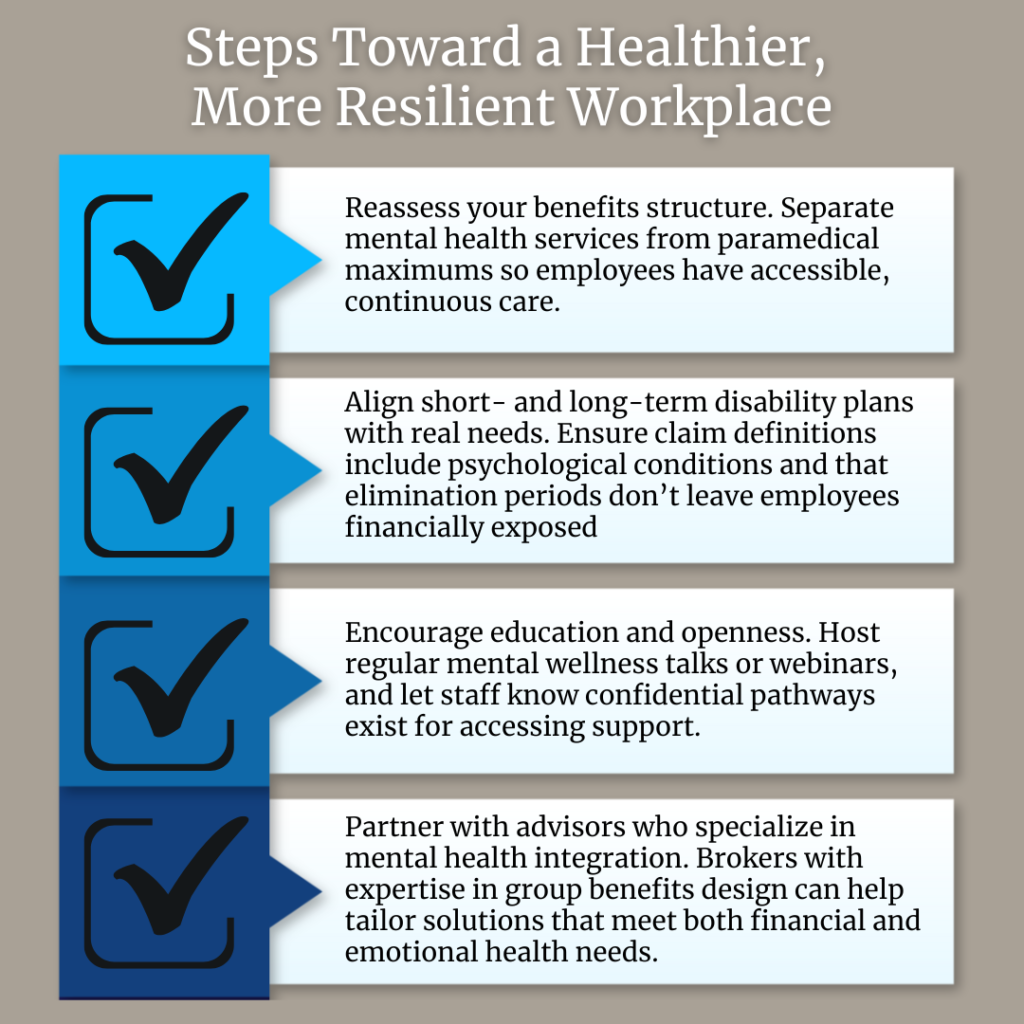- September 23, 2025
- Posted by: Deepak
- Category: Mental Health

Experience this blog through our audio narration.
Burnout has quietly become Canada’s most expensive workplace epidemic.1 The Mental Health Research Canada 2025 report found that almost half of employees are battling symptoms of burnout, costing businesses up to $28,000 per worker every year.2 Against this backdrop, World Mental Health Day on October 10 serves as a reminder that mental health isn’t just about feeling well—it’s about staying secure when illness interrupts our ability to work. Awareness sparks conversation, but lasting change comes from employers building benefits that support recovery, stability, and peace of mind.
A New Era of Mental Health Awareness

Every year, nearly one in five Canadians experiences a mental health challenge, and on any given week, about 500,000 Canadians are unable to work due to mental illness.3 This year’s World Mental Health Day theme—“Access to Services: Mental Health in Catastrophes and Emergencies”—could not be timelier. Wildfires, economic pressures, and workforce stress are all compounding the nation’s mental health crisis.4
The federal health minister, Marjorie Michel’s recent statement emphasized that “when Canadians are feeling good, our country is stronger.”5 Yet despite growing awareness, access remains one of the biggest barriers to care. The Canadian Mental Health Association (CMHA) reports that over 2.5 million Canadians can’t access the mental health support they need, and that public spending on mental health sits at just 6.3 percent of total healthcare budgets—half the recommended level of 12 percent.6
The Human Cost Behind the Numbers

The Link Between Mental Health and the Economy
When employees
know they’re protected, they’re more likely to seek help early, recover faster, and return to work successfully.
Mental illness costs the Canadian economy nearly $50 billion every year through absenteeism, lost productivity, and health care expenses.9 And while many companies now offer psychological services as part of extended health plans, coverage limits and eligibility restrictions still prevent real access for many.
A significant number of Canadians still depend on provincial disability programs or EI sickness benefits, which cover only a fraction of their income. According to Statistics Canada, only 9 percent of adults with disabilities actually receive CPP or QPP disability benefits—leaving a large majority financially vulnerable during their illnesses.10 Robust disability coverage not only changes that picture but helps businesses safeguard productivity and morale.
Why Income Protection Is Mental Health Support
- Short-Term Disability (STD): Provides temporary income—typically up to 26 weeks—for employees facing severe stress, depression, or other mental health conditions. This coverage allows individuals to focus on recovery instead of financial pressure.11
- Long-Term Disability (LTD): Steps in when conditions persist or relapse prevents return to work. By replacing 60 to 70 percent of pre-disability income, LTD coverage offers stability during prolonged recovery or permanent impairment.12


- Benefits Canada (2025 – How 5 Employers Are Designing Mental‑Health Benefits That Cater to a Diverse Workforce)
- Benefits Canada (2024 – Work Still to Be Done to Address Mental‑Health Risks in the Workplace)
- CAMH (2020 – Workplace Mental Health: A Review and Recommendations)
- Benefits Canada (2025 – Consultants Report on Benefits Strategy)
Mental Health as a Competitive Advantage
Today’s workforce expects employers to care about more than performance targets—they want workplaces that support their well-being. In the current labor market, offering mental health–inclusive benefits has become a powerful retention and recruitment tool.
Organizations that provide accessible counselling, flexible wellness programs, and comprehensive disability coverage report:
- Lower long-term disability claim rates
- Higher employee engagement and attendance
- Reduced turnover and absenteeism costs
It’s no surprise that surveys now show over 70 percent of Canadian employees consider mental health support one of the most valuable parts of their benefits package.13 For brokers, advisors, and employers alike, this shift underscores a growing truth: protecting mental health is foundational to protecting business.

To learn more about mental health, and access community programs, visit the Canadian Mental Health Association Calgary website.
Bringing It All Together
This October, as Canadians reflect on World Mental Health Day, the conversation will not end at awareness—it points toward action. Mental health support cannot stop at empathy or slogans. True care means ensuring that when life becomes overwhelming, employees have access not only to counselling but to income protection and time to heal.
For employers, integrating short-term and long-term disability benefits into health plans is a practical, compassionate, and forward-thinking strategy. It builds resilience into corporate culture, reduces future claims, and demonstrates genuine investment in people.
In a world where crises—economic, environmental, and personal—are becoming more frequent, mental health protection is no longer optional. It’s a shared responsibility between leaders, insurers, and employees to build a system that cares for the mind as much as it safeguards livelihoods.
Citations
1- MHRC, Workplace Mental Health 2025
https://www.mhrc.ca/workplace-mental-health
2- CharityVillage, 1 in 2 Employees Face Mental Health Challenges
https://resources.charityvillage.com/1-in-2-employees-face-mental-health-challenges-according-to-the-new-mental-health-in-the-workplace-2025-report/
3- Health Canada, Statement from the Minister of Health on World Mental Health Day
https://www.canada.ca/en/health-canada/news/2025/10/statement-from-the-minister-of-health-on-world-mental-health-day.html
4- Mental Health Commission of Canada (MHCC), We Improve – Program Framework (National Overview) https://mentalhealthcommission.ca/improve/
5- Health Canada, Statement from the Minister of Health on World Mental Health Day 2025
https://www.canada.ca/en/health-canada/news/2025/10/statement-from-the-minister-of-health-on-world-mental-health-day.html
6- Canadian Mental Health Association (CMHA), The state of mental health in Canada: Ground-breaking CMHA report reveals troubling trends
https://cmhato.org/news/the-state-of-mental-health-in-canada-ground-breaking-cmha-report-reveals-troubling-trends/
7- Western Medical Assessments, blog (quoting Sun Life and Mental Health Research Canada data)
Mental Health Claims on the Rise: Why Canadian Employers Should Act Now
https://westernmedical.ca/mental-health-disability-claims-canada-2025/
8- CSA Group – Mental Health at Work Report 2025 (PDF)
https://www.csagroup.org/wp-content/uploads/CSA_Public-Policy_Mental-Health-at-Work-Report_Edits_03.12.2025.pdf
9- Centre for Addiction and Mental Health (CAMH), Mental Illness and Addiction: Facts and Statistics
https://www.camh.ca/en/driving-change/the-crisis-is-real/mental-health-statistics
10- Statistics Canada, Statistics Canada, Uptake of the Disability Tax Credit and the Canada Pension Plan or Quebec Pension Plan Disability Benefits Among Persons with Disabilities in Canada https://www150.statcan.gc.ca/n1/pub/36-28-0001/2025002/article/00001-eng.pdf
11- Government of Canada: EI Sickness Benefits
https://www.canada.ca/en/services/benefits/ei/ei-sickness/benefit-amount.html
12- Government of Canada: Disability Insurance
https://www.canada.ca/en/financial-consumer-agency/services/insurance/disability.html
13- Benefits Canada, 47% of Canadian Employees Relying on Workplace Benefits to Improve Well‑Being: Report
https://www.benefitscanada.com/benefits/health-wellness/47-of-canadian-employees-relying-on-workplace-benefits-to-improve-well-being-report/
Share Us
WE WOULD APPRECIATE YOUR FEEDBACK FOR THIS BLOG!
Help us serve you better. If you found this blog insightful, take a moment to rate it—it helps us continue creating content you care about!
How useful was this post?
Click on a star to rate it!
Average rating 0 / 5. Vote count: 0
No votes so far! Be the first to rate this post.

Talk to your Benefits Advisor
403-903-2898
587-430-0516
Call us if you have any further questions .
1925 18 Ave NE #115,
Calgary, AB T2E 7T8
Email: info@wescaninsurance.ca



